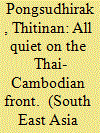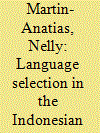|
|
|
Sort Order |
|
|
|
Items / Page
|
|
|
|
|
|
|
| Srl | Item |
| 1 |
ID:
163112


|
|
|
|
|
| Summary/Abstract |
That Thai-Cambodian relations are stable and peaceful after Thailand’s most recent military coup in 2014 is counterintuitive and inconsistent with recent trends and dynamics. When governments loyal to Thaksin Shinawatra took power over the past decade, bilateral relations were cordial and constructive. Conversely, when anti-Thaksin governments were in office, Thai-Cambodian relations became unstable and adversarial. But this has not been the case after the military regime under General Prayut Chan-ocha seized power and overthrew the Thaksin-aligned government of Prime Minister Yingluck Shinawatra. The dominant strand of scholarly explanations attributes the volatile bilateral relationship to Thai historical forces interacting with domestic politics, underpinned by a ‘national humiliation’ discourse dating to French imperialism. But such an informed understanding is unable to pinpoint the timing and extent of the bilateral conflict when it flared up. Synthesising overlapping streams of literature and drawing on select interviews, this article sets out to demonstrate that the post-coup Thai government’s commitment and resolve to prevail at all costs ahead of the royal succession and the incumbent Cambodian government’s weakened political legitimacy at home have combined to situate and normalise bilateral relations on a new plateau.
|
|
|
|
|
|
|
|
|
|
|
|
|
|
|
|
| 2 |
ID:
163111


|
|
|
|
|
| Summary/Abstract |
While the general literature analysing mobility patterns in Thailand’s southern border provinces largely indicates insecurity and violence as precipitating factors for migration, such explanations fail to fully explain why the majority of those who migrate do so within the conflict area rather than away from it. Based on fieldwork, this article argues that while a lack of security measures and higher levels of violence in rural areas have induced people to migrate to more urban areas, a variety of factors, including emotional attachment to homeland, and cultural and religious considerations have influenced peoples’ decision to stay. Most importantly, the accumulation of ‘insider advantages’, enable most to adapt and seek employment despite the present circumstances.
|
|
|
|
|
|
|
|
|
|
|
|
|
|
|
|
| 3 |
ID:
163114


|
|
|
|
|
| Summary/Abstract |
This article interrogates one of the most important emerging bilateral relationships in East Asian international relations: Japan’s politico-economic relations with Burma/Myanmar (herein referred to as Burma). A long-time ally since the Second World War, Japan’s role in Burma came under increasing and eventually unbearable pressure with US sanctions from the 1990s. However, since 2011 Japan has rapidly extended its influence in Burma—influence understood multi-dimensionally as comprising institutional, ideational, and material power—and built upon those well-established historical ties. This rush to rejuvenate relations has been driven by more than historical amity. It has been due to various shifts in the forms of state in East Asia and changes in the regional power order—principally increasing competition with China—and has also been informed both by Burma’s desire to begin internationalizing and industrializing and Japan’s enthusiastic assistance in this process. The article interrogates three key questions associated with these post-2011 developments: What has been the nature of Japan’s rush to rejuvenate its relations with Burma? Why has this been such a priority for Japan at this time? And how has Japan been endeavoring to secure its foreign policy goals with Burma? It concludes that Burma is in the middle of a period of great tension, and despite its democratic transformation (or rather because of it) is not best placed to handle the forces bearing down upon it. Great caution and attention is needed towards Burma, the “final frontier” of Southeast Asia, as big changes are coming and with these come significant and potentially overwhelming challenges for the country, its leaders and its people.
|
|
|
|
|
|
|
|
|
|
|
|
|
|
|
|
| 4 |
ID:
163113


|
|
|
|
|
| Summary/Abstract |
In the post-New Order era, the use of English in Indonesia is noticeably increasing, particularly in otherwise Indonesian popular print texts, a domain where language selection is evident and publicly accessible. The appearance of English in Indonesian popular texts is linguistically known as code-switching, called bahasa gado-gado in the Indonesian context. Although noticeably increasing, English is still unfairly treated by many Indonesians and by the government as a foreign language that carries the “West” ideology. In other words, English not only functions as a linguistic resource but also as a language of Otherness that may carry some Western ideologies for many Indonesians. In fact, the juxtaposition of English and Indonesian in otherwise Indonesian speech acts still receives social censure or is seen as an interference to Indonesian-ness. Using an interpretive textual analysis, I show that code-switching with special reference to English effectively functions to express the overt love expressions and to project one’s socio-cultural hybridity and lingustic proficiency.
|
|
|
|
|
|
|
|
|
|
|
|
|
|
|
|
| 5 |
ID:
163115


|
|
|
|
|
| Summary/Abstract |
Marshall Sahlins argues that kings are ‘stranger kings’, as they typically originate from outside their kingdom or from the celestial realms. He advances that kings draw authority precisely from an ability to appropriate a geographic and cosmological Other for the benefit of their subjects. With this article, I propose that, in contemporary Thailand, a kingdom ruled by a Buddhist monarch, this defining ability of kings spreads to commoners. An ethnographic study of diviners (mo du) and their clients (luk kha) in Bangkok reveals that Thai Buddhists routinely make cosmologies. Such cosmology-making entails appropriating foreign and divine forms of knowledge in the manner of kings. I argue that this phenomenon allows commoners to master the idioms of power of Thai Buddhist kingship. This results in tensions between commoners, and places them in an ambiguous relationship with the monarchic state.
|
|
|
|
|
|
|
|
|
|
|
|
|
|
|
|
|
|
|
|
|